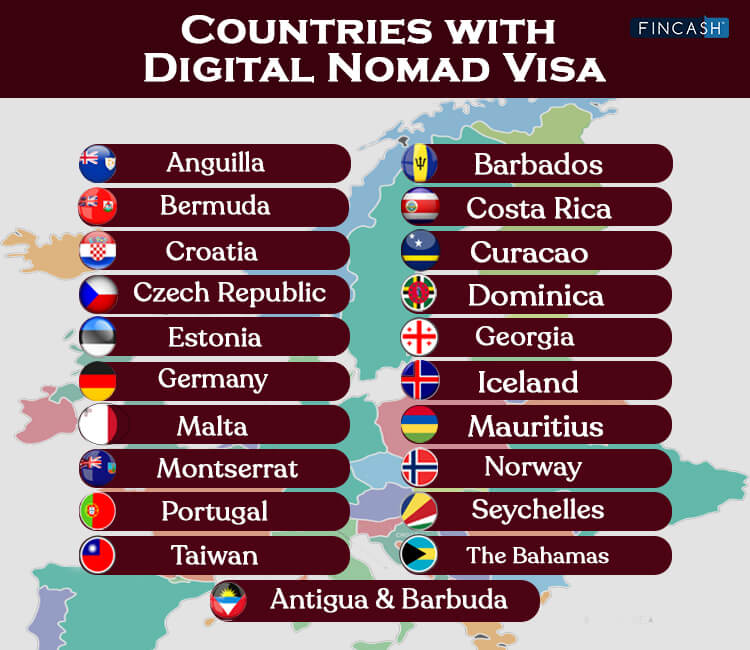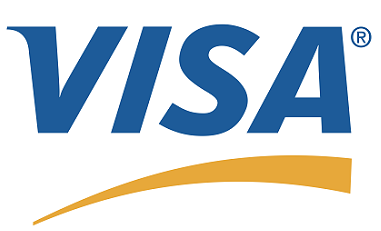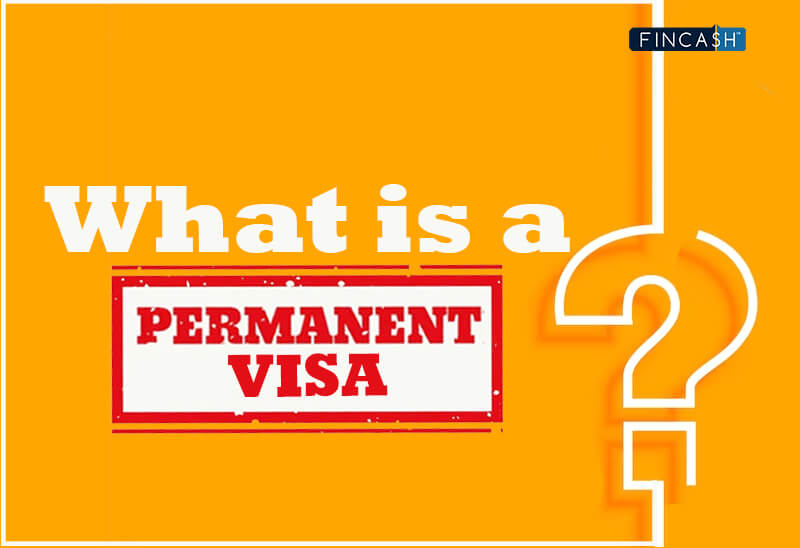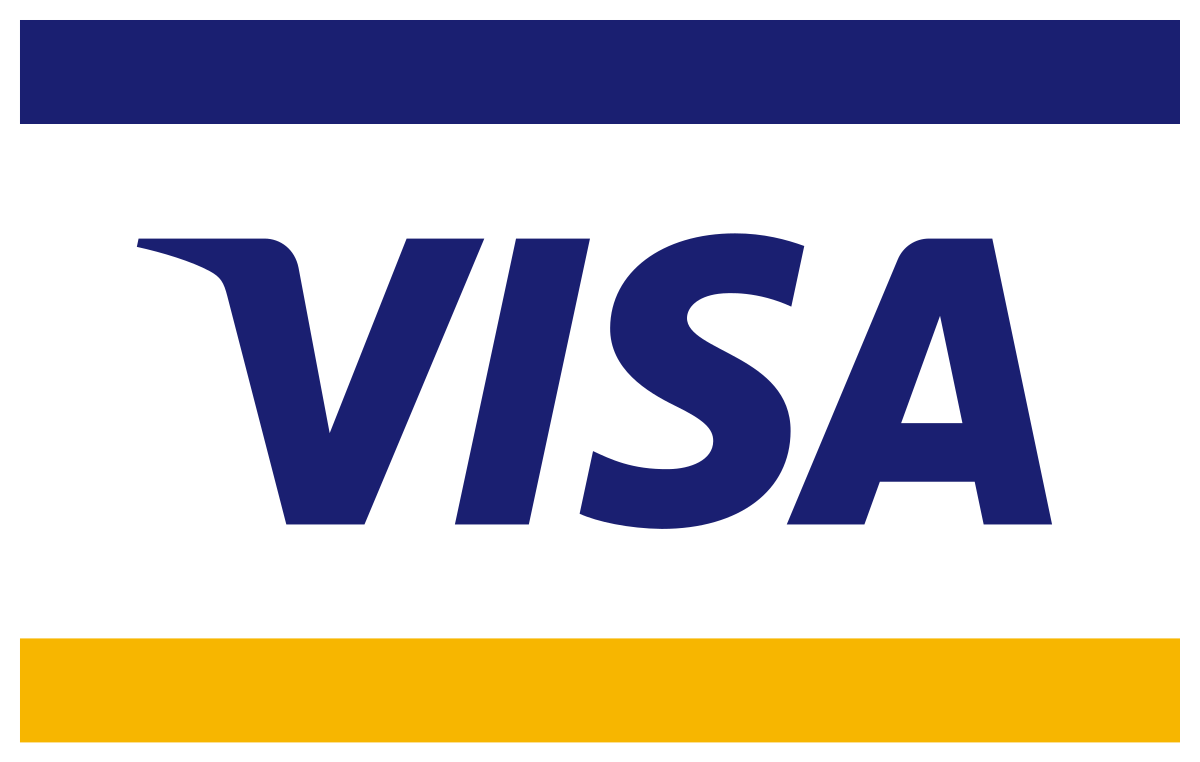
Fincash » Indian Passport » Countries With Digital Nomad Visa
Countries With Digital Nomad Visa
The digital nomad lifestyle has challenged the traditional 9-to-5 work model confined to a specific location. This has given rise to digital nomads, who leverage technology to work remotely, often while travelling from one place to another. They are not tied to a particular office or location, and this newfound flexibility has led to a surge in popularity. The concept of digital nomadism aligns with the changing nature of work. Many jobs today can be performed with a laptop and an internet connection, which means professionals can fulfil their job responsibilities from virtually anywhere on the planet. In response, numerous countries have begun to issue special visas tailored to the digital nomad community.

This has resulted in countries adapting to this trend by Offering digital nomad visas. These visas cater to those who want to work while exploring new horizons, offering the freedom to relocate frequently without the hassle of traditional work visas. This article explores the concept of digital nomad visas and highlights countries that have embraced this global work revolution.
What is a Digital Nomad Visa?
A digital nomad visa, sometimes called a remote work visa, is a special type that allows individuals to work legally in a country for an extended period without being tied to a specific employer or location. These visas are designed to attract remote workers, freelancers, and entrepreneurs who can contribute to the local Economy while enjoying a change of scenery. Typically, digital nomad visas have specific requirements, such as proof of employment, Income, and health insurance.
Countries Welcoming Digital Nomads
Here is the list of countries offering digital nomad visas:
1. Anguilla
In Anguilla, the Beyond Extraordinary Anguilla program invites people to live in this British Overseas Territory for up to 12 months. A travel fee of approximately Rs. 1,66,475 ($2,000) per individual is required to work remotely from this idyllic island. Families of up to four members must pay a fee of approximately Rs. 2,49,713 ($3,000), with an additional Rs. 20,809 ($250) charged for each extra family member. Prospective travellers interested in this program are required to complete an application form and furnish several other essential documents, including:
- Evidence of employment
- A copy of their birth certificate
Approval for participation in the remote work program is typically processed within approximately 14 days.
2. Antigua & Barbuda
Antigua and Barbuda offer the Nomad Digital Residence program, catering to remote workers seeking a long-stay arrangement. This visa provides a two-year validity and costs approximately Rs. 1,24,856 ($1,500) for individuals. Couples and families comprising three or more members must pay approximately Rs. 1,66,475 ($2,000) and approximately Rs. 2,49,713 ($3,000), respectively. Applicants are expected to complete the application process, which entails submitting up to 11 documents, including proof of an expected income of at least approximately Rs. 41,61885 ($50,000) for each year of their intended program.
3. Barbados
Barbados offers the Welcome Stamp visa, which allows remote workers and their families to stay and work on the island for up to one year. The application costs approximately Rs. 1,66,475 ($2,000) for solo applicants and approximately Rs. 2,49,713 ($3,000) for families. As part of the application process, candidates are obliged to furnish a Range of documents, which include:
- Two identical photographs measuring 50 x 50 mm
- The passport's bio-data page
- Documentation verifying the relationships of accompanying dependents, where applicable
Additionally, applicants must provide evidence of their capability to generate an income of at least Rs. 41,62,375 ($50,000) during their 12-month stopover.
Talk to our investment specialist
4. Bermuda
Bermuda's "Residential Certificate" allows digital nomads to live and work on the island for up to one year. The Work From Bermuda Certificate allows people to work remotely for 12 months. To initiate this process, applicants must submit an application fee of approximately Rs. 21,891 ($263), accompanied by evidence of health insurance and proof of employment.
While there isn't a specific minimum income requirement, individuals seeking this certificate must possess sufficient income to sustain themselves throughout the entire 12-month. For those considering bringing their family along, family members will also be required to submit separate applications and pay the relevant fees. All individual or family-based applications must be submitted on the same day to ensure a streamlined process. The anticipated turnaround time for the application is approximately five business days.
5. Costa Rica
Known for its natural beauty and biodiversity, Costa Rica offers the "Pensionado Visa," ideal for retirees, and the "Rentista Visa," which suits those with a guaranteed monthly income. This nation in Central America presents the Rentista visa, a temporary residency option that extends a two-year window for remote work. To qualify for this visa, prospective visitors must demonstrate a monthly income of approximately Rs. 2,08,094 ($2,500), although this amount may vary if there are additional dependents. The visa application also encompasses various requirements, including:
- Fee payments
- Submission of fingerprint records
- Provision of a copy of the applicant's birth certificate
The permit remains renewable, contingent on fulfilling all stipulated requirements.
6. Croatia
With its stunning Adriatic coastline, Croatia's Digital Nomad Visa invites remote workers to explore its beauty while pursuing their careers. Although not explicitly providing a visa for digital nomads, Croatia has implemented a program catering to this group. This initiative offers a temporary stay lasting up to one year, with no option for extension. Renewal is achievable by submitting a new application, extending the stay for six months.
To become eligible for this program, prospective visitors are required to assemble various documents for their application. Form 1a is one of the necessary documents if submitting the application in person. Applicants must also demonstrate a monthly income of approximately Rs. 2,07,882 (€2365) or an annual income of approximately Rs. 24,94,629 (€28385). The income requirements increase by 10% for each family member included in the application. Additionally, applicants are responsible for paying a fee ranging from Rs. 4082 (€46.45) to Rs. 5365 (€61.05), depending on the chosen application method.
7. Curaçao
The Dutch Caribbean island of Curaçao offers the @HOME in Curaçao program, extending an invitation to remote workers for an initial period of six months, with the potential for a further six-month extension. The application process requires a total fee of Rs. 24,466 ($294), along with the submission of:
- A copy of a passport photo
- Proof of financial solvency
- Evidence of health insurance
Processing typically takes around two weeks. All applicants must apply individually, but families can also participate in the program under the main applicant, albeit with an additional fee applying to any dependents.
8. Czech Republic
The Czech Republic's freelancer visa, known as Zivno, is somewhat more complex than most other options. This program requires payment of a variable fee and proof of a minimum income of approximately Rs. 4,43,696 (124,500 Czech koruna). Applicants must also obtain a trade license for one of the approved jobs on a designated list before applying. This means they will manage remote work alongside a local career, although it's temporary. Additionally, applicants are subject to an immigration interview as part of the process. The visa is issued for one year, and the approval period can range from 90 to 120 days.
9. Dominica
Dominica, often called the Nature Island of the Caribbean, offers an 18-month Work In Nature Extended Stay Visa tailored for digital nomads. To qualify for this visa, applicants must provide proof of anticipated income of Rs. 41,60,825 ($50,000). Additionally, they must cover the cost of Rs.8,321 ($100) application fee and either Rs. 66,573 ($800) fee for single applicants or Rs. 99,859 ($1,200) fee for families. Furthermore, applicants need to submit several other supporting documents, including:
- The biodata page of their passport
- A Bank reference letter
- Evidence of valid health insurance
The approval letters for successful applicants are typically dispatched within 14 to 28 days.
10. Estonia
On August 1, 2020, Estonia introduced an official Digital Nomad Visa program, offering remote workers the opportunity to stay in the country for up to one year. Estonia's e-residency program allows remote workers to operate businesses while residing there. Digital nomads can benefit from the country's tech-savvy environment and beautiful landscapes. To qualify for this visa, applicants must show a minimum monthly income of approximately Rs. 3,07,875 (€3,504) and are responsible for a state fee of Rs. 7,029 (€80) for a Type C visa (for short stays) or Rs. 8,786 (€100) for a Type D visa (for longer stays). Additional prerequisites include:
- A valid travel document
- Adequate health insurance
- Successful clearance of a background check
Applicants must submit their applications in person at the nearest Estonian Embassy or Consulate, with the typical processing time ranging from 15 to 30 days.
11. Georgia
Georgia's Remotely From Georgia initiative permits digital nomads and their families to work within this former Soviet state for one year. This program extends to travellers from almost 95 countries. The eligibility list primarily encompasses nations whose residents previously enjoyed one-year visa-free access to Georgia before the pandemic's onset. Applicants are only required to complete an online application form and furnish financial proof, although the specific amount and any other requested information aren't explicitly stipulated.
12. Germany
Germany's residence permit caters to freelancers and self-employed workers, allowing them to reside in the country for an initial three-month period, potentially extending this duration to three years. In addition to the visa application form and a fee of Rs. 5,271 (€60), digital nomads must include photocopies of various documents with their application, which includes, but is not restricted to:
- A valid passport
- Two biometric photographs
- A cover letter
- A Portfolio showcasing their prior freelance work
The application process necessitates in-person submission at the nearest German Embassy or Consulate. Before applying for the residence permit, prospective travellers must establish a German residence and register it with the local Residence Registration Office.
13. Iceland
The program offering long-term visas for remote workers is accessible to digital nomads hailing from countries that do not necessitate a visa for travel to Iceland. However, this program is not available for citizens of the EU, the European Economic Area, or the European Free Trade Association. Each applicant is required to submit an individual application and pay a processing fee of Rs. 7,268 (12,200 ISK) for each application separately. Applications will also entail submitting the following:
- A recent passport photo
- Copies of the passport
- Proof of health insurance
- Evidence of the purpose of their stay in Iceland
- Potentially, a criminal record check
All applications must be delivered in person or through mail to the Directorate of Immigration at Dalvegur.
14. Malta
The Nomad Residence Permit enables people to work remotely for one year, with the option for renewal. However, this permit is exclusively available to individuals from non-EU countries. Family members of remote workers must make separate applications. To be eligible, applicants must show gross monthly income criteria of Rs. 2,37,300 (€2,700). Alongside this, they must:
- Possess a valid travel document
- Maintain adequate health insurance
- Secure a valid property rental or purchase agreement
- Successfully pass a background check
After submitting the application and all required documents via email, instructions for paying a Rs. 26,366 (€300) administrative fee per applicant will be provided.
15. Mauritius
The premium Travel Visa allows individuals to work remotely abroad for one year, which is extendable. The most appealing aspect of this visa is that it is entirely free. However, applicants still need to demonstrate a minimum monthly income of Rs. 1,24,835 ($1,500) for each applicant and Rs. 41,611 ($500) per month for every dependent below the age of 24. Prospective travellers must submit various documents along with their online application, including:
- A valid passport
- Proof of travel and health insurance
- If applicable, a copy of their marriage certificate
The processing of applications is completed within 48 hours.
16. Montserrat
The Montserrat Remote Work Stamp grants the privilege of remote work for a year, subject to proof of an annual income of approximately Rs. 58,25,638 ($70,000). A fee of Rs. 41,611 ($500) applies for single travellers or Rs. 62,417 $750 for families of up to three dependents, with an additional Rs. 20,805 ($250) fee for any extra dependents. Additionally, applicants must provide:
- Evidence of valid health insurance
- A copy of passport biographical data
- A passport-size photo
- A police record
- Proof of employment
The processing of applications is typically completed within seven working days.
17. Norway
The Independent Contractor Visa offers remote workers a two-year residency option in Norway. This visa has a fee of Rs. 52,743 (€600) and mandates that applicants demonstrate an annual income of no less than Rs. 31,39,912 (€35,719). The Norwegian Directorate of Immigration has an online checklist specifying the necessary documentation, which includes:
- A passport
- Two passport-sized photos
- Proof of residence in Norway
All these documents should be submitted alongside the application and the completed checklist. Applications and all the required documents should be sent to the nearest Norwegian Embassy or Consulate.
18. Portugal
Portugal extends the D7 passive income visa to self-employed individuals, granting a one-year validity. This visa is subject to renewal twice, with each extension allowing for two additional years. The visa carries a cost of Rs. 7,296 (€83) and a resident permit fee of Rs. 6,366 (€72.42). As part of the application process, prospective residents must submit various documents. These include:
- A valid passport
- Two passport-size photos
- Proof of active Travel Insurance
- Evidence of their residence status (if applicable)
- Substantiation of adequate income or a term of responsibility endorsed by a Portuguese citizen or resident
- Verification of business ownership or a contract for service provision
- An official declaration affirming the applicant's qualifications for employment in their respective sector (if applicable)
Additionally, there is a separate residence permit available for a family reunion.
19. Seychelles
The Seychelles Workcation program allows digital nomads the flexibility to engage in remote work from any of the 115 islands that constitute the archipelago, ranging from a month to one year. This program entails a fee of Rs. 3,955 (€45), and individuals interested in participating must furnish:
- A valid passport
- Evidence of their employment or business ownership
- Proof of income (with the exact amount unspecified)
- A valid medical and travel insurance policy when submitting their application
Furthermore, family members can accompany the primary applicant as regular visitors, provided they fulfil all prerequisites and supply the necessary birth and/or marriage certificates as applicable.
20. Taiwan
Taiwan offers a distinctive approach with the Taiwan Employment Gold Card, which is not precisely a digital nomad visa but rather a comprehensive four-in-one card. It combines an unrestricted work permit, a resident visa, an alien resident certificate, and a re-entry permit into a single document. This card provides individuals, whether remote workers or others, the opportunity to reside in Taiwan for a period ranging from one to three years. The cost of this card varies from Rs. 8,323 ($100) to Rs. 25,802 ($310), depending on the applicant's nationality and the intended duration of their stay.
Applications typically undergo a 30-day approval process, although this timeframe may extend to 50 to 60 days if there's a need for additional documents. Eligibility for the card is determined by an evaluation of the applicant's professional skills. In addition to the standard requirements of a passport and a photograph, digital nomads must provide supplementary documentation depending on the specific skill category they are applying under.
21. The Bahamas
The Bahamas Extended Access Travel Stay initiative welcomes digital nomads, allowing them to work remotely for one year on any of the 16 captivating islands of this archipelago. The application process entails a modest Rs. 2,080 ($25) fee, along with the submission of:
- A valid passport data page
- A medical insurance card
- Proof of employment
Impressively, the application is usually processed within a swift five-day period. Successful applicants must pay Rs. 83,232 ($1,000) for the Work Remotely permit, with an additional Rs. 41,616 ($500) for each dependent.
Conclusion
More countries are recognising remote workers' value to their economies and the richness of cultural exchange they foster. Whether you're looking to escape your daily routine, experience new cultures, or simply work from a picturesque beach, digital nomad visas offer opportunities for those ready to embrace the nomadic lifestyle. As these programs evolve, more countries are expected to join the list of destinations embracing the future of work. In addition to the ones highlighted above, several other countries offer digital nomad visas, including Spain, Greece, Hungary, Dubai, Thailand, and Indonesia.
All efforts have been made to ensure the information provided here is accurate. However, no guarantees are made regarding correctness of data. Please verify with scheme information document before making any investment.












